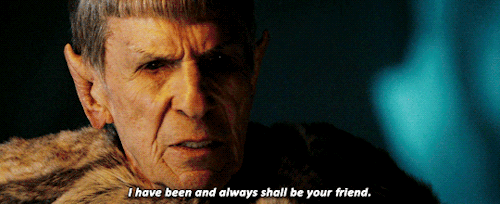Entertainment
By Focusing On Character, Not Chaos, 2009's 'Star Trek' Ushered In A Bold New Era Of The Series

In May 2009, the Star Trek universe boldly went where it hadn't gone in, well, quite a few years: to the movie theater. Starring Chris Pine and Zachary Quinto as Kirk and Spock, respectively, Star Trek stood out from the pack and succeeded because it did what the franchise does best: it focused on character, not action.
Star Trek, or ST09 as it's referred to by Trekkies, went back in time to the 23rd century to revisit the stories of Kirk (Pine), Spock (Quinto), Bones (Karl Urban), Uhura (Zoe Saldana), Chekov (Anton Yelchin), Scotty (Simon Pegg), and Sulu (John Cho), with a special appearance from Leonard Nimoy, who played Spock on Star Trek: The Original Series (TOS). The movie's use of time travel allowed director J.J. Abrams to create an alternate timeline, known now as the Kelvin Timeline, so as to not mess with the events of TOS. It was a pretty big gamble, and leading into Star Trek's release, some fans were worried how it'd go.
Yet ST09 ended up a hit, coming in at 94% on Rotten Tomatoes, making over $385 million worldwide, and becoming the first Star Trek movie to win an Oscar (for Best Makeup). Some of the film's success came from its ability to address the nostalgia fans felt for the franchise's characters and still introduce new, compelling faces. Another part was due to the movie's timing; the most recent Star Trek film was 2002's Nemesis, and the prequel show, Enterprise, ended in 2005. While four years may not be that long to go without a new installment of a series, it felt very long to fans, considering that there had previously been either a Star Trek TV show or movie around since 1987. By the time ST09 hit theaters, fans were thirsty for something new.
The biggest element of Star Trek's success, however, was its unique place in the world of sci-fi and fantasy blockbusters. While the film indeed took the premise of TOS and made it grander, with bigger ships and more explosions, it never lost the heart of the series: its devotion to its characters. Take how it captured the essence of the friendship between Kirk and Spock, for instance. The movie affectingly showed how the iconic heroes overcame a rough start to eventually care deeply for one another, with their bond spanning generations and even dimensions.
Additionally, all of Star Trek's characters felt perfectly cast, and the actors' performances came off as loving tributes, not caricaturish impersonations. Be it through Urban's frustration as Bones, Pegg's giddiness as Scotty, or Saldana's no-nonsense intelligence as Uhura, each actor captured everything fans loved most about the originals. Those heartfelt performances, combined with the movie's clear love of science, appreciation for exploration, and respect for discovery, made Star Trek feel wonderfully grounded.

The franchise's welcome focus on humanity didn't last, unfortunately. Star Trek's two sequels, 2013's Star Trek Into Darkness and 2016's Star Trek Beyond, both tried to be bigger, twistier, and more serious, and as a result they blended into the rest of the summer blockbuster landscape filled with action-packed Star Wars and Marvel releases. Without a focus on character, the movies earned lackluster receptions, and a planned fourth Star Trek film is now dead in the water.
After the sequels failed to capture the original's strengths, the franchise moved back to television, and on this platform, Star Trek has thrived. CBS All Access' Star Trek: Discovery, a series with a black, female lead; a gay couple; and a plethora of women in a variety of roles is critically acclaimed and getting a third season. Thanks to that show's popularity, several other series are in the works, including one that'll feature Patrick Stewart returning to his Next Generation role of Captain Jean-Luc Picard. Not much is known yet about that series, but Discovery, at least, has featured impressive character arcs and growth, with a devotion to the inner lives of its leads that's a clear reflection of 2009's Star Trek.
By making the bold choice to explore both interpersonal connections and the greater question of how humanity fits into the universe, Star Trek successfully brought a beloved franchise into the 21st century. And as more Trek-related TV shows arise, perhaps they'll continue to embrace those elements and show off what sets the series apart from its many space-set peers.